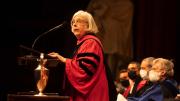When Vincent Brown went on the job market eight years ago, he almost took his films--a few short comedies, nothing academic--off his CV for fear of not looking like a “serious” scholar. “It’s a good thing I did” leave them on, the professor of history and of African and African American studies says now, because the search committee at Harvard viewed this multimedia experience as an asset. Indeed, these earlier films laid the groundwork for one of his two major academic projects to date: Herskovits at the Heart of Blackness, a documentary that he produced based on his own research, aired on PBS earlier this year and has won numerous film-festival and academic awards. The late Melville Herskovits, a Northwestern University anthropologist whose books include The Myth of the Negro Past, documented cultural continuities between African societies and slaves in the Americas, and helped change the notion, popular in academia at the time, that there was nothing of worth to be found in African culture. Brown says the “gorgeous” footage Herskovits shot (of dances, music-making, and agricultural techniques, for example) made film the right medium for telling this story. His second project is in a more conventional format: a book on the meaning of death, and the rituals surrounding it, in the society of Jamaican slaves and slaveowners. Brown’s next book project aims to connect slave revolts in the Americas with concurrent political developments in Africa, following in the footsteps of Herskovits, whose name is still little-known despite his seminal contribution to the discipline of African American studies. He is, says Brown, “one of the most important scholars you never heard of.”
Historian Vincent Brown uses multiple media to study slavery
Historian Vincent Brown uses multiple media to study slavery
The professor of African and African American studies uses multiple media to study slavery.

You might also like
Mount Vernon, Historic Preservation, and American Politics
Anne Neal Petri promotes George Washington and historic literacy.
Harvard Professor Michael Sandel Wins Philosophy’s Berggruen Prize
The creator of the popular ‘Justice’ course receives a $1 million award.
Power is Knowledge
Who gets to make universal art?
Most popular
Explore More From Current Issue

This TikTok Artist Combines Monsters and Mental Heath
Ava Jinying Salzman’s artwork helps people process difficult feelings.

A Near-Perfect Football Season Ends in Disappointment
A loss to Villanova derails Harvard in the playoffs.






